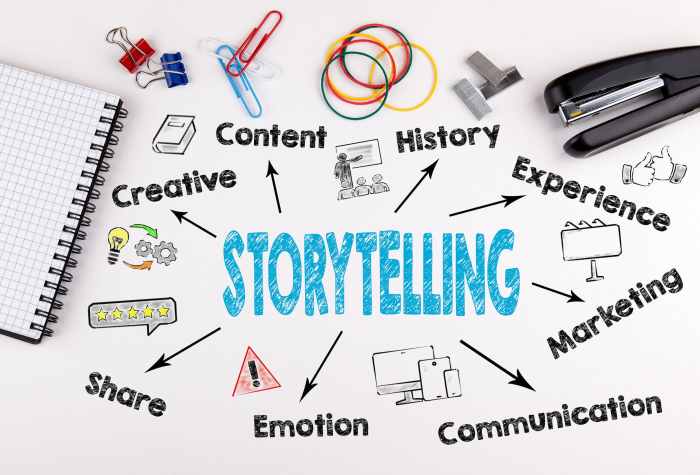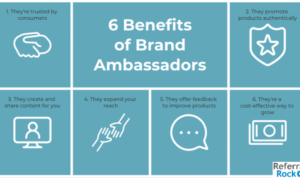Kicking off with Effective Storytelling in Marketing, this topic dives into the impact of storytelling on consumer engagement, the key elements of a compelling brand story, strategies for implementation, and measuring its success. Get ready to explore the power of storytelling in marketing!
Importance of Effective Storytelling in Marketing
Effective storytelling in marketing is crucial for capturing the attention and interest of consumers. By creating a narrative that resonates with the target audience, companies can establish a strong emotional connection with their customers, leading to increased engagement and loyalty.
Storytelling also plays a key role in differentiating a brand in a competitive market. In a sea of similar products and services, a compelling story can set a company apart from its competitors and make it more memorable to consumers. This uniqueness can help drive sales and build a distinct brand identity.
Impact on Consumer Engagement
Storytelling has the power to evoke emotions, trigger memories, and create a sense of belonging among consumers. When a brand tells a story that resonates with its audience, it can capture their attention and keep them engaged. This engagement can lead to increased brand awareness, customer loyalty, and ultimately, higher sales.
- Storytelling creates a memorable brand experience that consumers are more likely to share with others.
- By connecting with consumers on a personal level, storytelling can build trust and credibility for the brand.
- Effective storytelling can influence consumer behavior and drive purchasing decisions.
Examples of Successful Marketing Campaigns
One notable example of a successful marketing campaign based on storytelling is Coca-Cola’s “Share a Coke” campaign. By personalizing their products with popular names and encouraging customers to share a Coke with friends and family, Coca-Cola created a powerful narrative around connection and sharing that resonated with consumers worldwide.
Another example is Nike’s “Just Do It” campaign, which tells inspiring stories of athletes overcoming challenges and pushing their limits. This campaign has helped Nike establish itself as a brand associated with determination, perseverance, and success, resonating with athletes and non-athletes alike.
- Apple’s iconic “1984” commercial, which aired during the Super Bowl, told a compelling story of breaking free from conformity and embracing individuality.
- Dove’s “Real Beauty” campaign challenges traditional beauty standards and celebrates diversity, resonating with consumers who seek authenticity and inclusivity.
- Budweiser’s “Puppy Love” commercial tugs at the heartstrings with a heartwarming story of friendship between a puppy and a Clydesdale, showcasing the bond between animals and humans.
Elements of Effective Storytelling
Effective storytelling in marketing relies on several key components that create a compelling brand story, engage consumers, and drive behavior.
The Role of Emotions in Storytelling
Emotions play a crucial role in storytelling as they have the power to connect with consumers on a deeper level, creating a memorable and impactful experience. By tapping into emotions such as joy, sadness, fear, or excitement, marketers can evoke empathy and build a strong emotional connection with their audience.
The Significance of Authenticity in Storytelling
Authenticity is essential in storytelling for marketing purposes as it builds trust and credibility with consumers. Authentic stories resonate with audiences because they are genuine, relatable, and transparent. When brands share authentic stories, they humanize their brand, making it more approachable and trustworthy in the eyes of consumers.
Strategies for Implementing Storytelling in Marketing

Effective storytelling in marketing can be implemented through various mediums and strategies to engage with customers and build brand loyalty. By utilizing different platforms such as video, social media, and blogs, companies can create compelling narratives that resonate with their target audience. Here are some tips on how to successfully integrate storytelling into your marketing efforts:
Utilizing Different Mediums
- Video: Creating visually appealing videos that tell a story about your brand can capture the attention of consumers and leave a lasting impression.
- Social Media: Leveraging platforms like Instagram, Facebook, and Twitter to share short stories, customer testimonials, and behind-the-scenes content can humanize your brand and connect with your audience on a personal level.
- Blogs: Publishing blog posts that narrate the journey of your products, share success stories, or provide valuable insights can establish your brand as an authority in the industry and attract organic traffic to your website.
Aligning Brand Values with Storytelling Narratives, Effective Storytelling in Marketing
It is crucial to ensure that the stories you tell align with your brand values and mission statement. By staying true to your core principles, you can build trust and credibility with your audience, ultimately leading to long-term customer relationships.
Importance of Consistency in Storytelling
Consistency is key when it comes to storytelling in marketing. Whether you are sharing your brand story through social media, email campaigns, or advertisements, maintaining a consistent tone, message, and visual identity helps reinforce brand recognition and fosters brand loyalty.
Measuring the Impact of Storytelling in Marketing

Storytelling in marketing is not just about crafting engaging narratives but also about measuring its effectiveness. By analyzing specific metrics, understanding the correlation between storytelling and brand loyalty, and examining real-life case studies, companies can assess the impact of their storytelling efforts.
Metrics Used to Evaluate the Success of Storytelling Campaigns
- Engagement Metrics: Tracking metrics like social media shares, comments, and likes can indicate how well the audience is connecting with the story.
- Conversion Rates: Monitoring the conversion rates from storytelling content can reveal its impact on driving customers to take desired actions.
- Brand Awareness: Assessing changes in brand awareness levels before and after storytelling campaigns can demonstrate their effectiveness in creating brand recognition.
Correlation Between Storytelling Effectiveness and Brand Loyalty
Effective storytelling has a direct impact on brand loyalty as it helps create emotional connections with customers. When consumers resonate with a brand’s story, they are more likely to remain loyal and advocate for the brand.
Case Studies Illustrating the ROI of Investing in Storytelling for Marketing Purposes
One notable case study is the “Share a Coke” campaign by Coca-Cola, where personalized labels with people’s names led to a significant increase in sales and brand engagement. Another example is Nike’s “Dream Crazy” campaign featuring Colin Kaepernick, which generated a buzz and strengthened customer loyalty.





